ARTICLE AD BOX
19 minutes ago
Kelly Ng & Lok Lee,in Singapore and Hong Kong

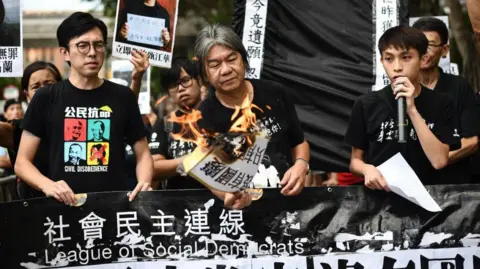 Getty Images
Getty Images
Former opposition lawmaker Leung Kwok-hung (centre) is among the 14 who have been found guilty of subversion
Hong Kong has found 14 pro-democracy activists guilty of subversion in the largest use yet of a China-imposed National Security Law.
They included former lawmakers Leung Kwok-hung and Helena Wong, journalist-turned-campaigner Gwyneth Ho, and ordinary Hong Kongers who joined the mass protests of 2019 such as nurse Winnie Yu.
They were among the 47 activists charged with trying to "overthrow" the government by organising an unofficial primary in 2020 to pick candidates who can run for office.
They would have "[created] a constitutional crisis for Hong Kong" if they had indeed been elected to the legislature, the court ruled on Thursday, agreeing with the prosecution’s argument.
As evidence the court also cited letters and campaign materials found at the defendants' homes and on their devices when they were arrested more than three years ago.
The court acquitted two of the defendants - former district councillors Lawrence Lau and Lee Yue-Shun - saying it "cannot be sure" that they were "parties to the scheme" or that they "had the intention to subvert the state's power". But the justice department said they would appeal the acquittals.
The 47 make up some of the most prominent names in the pro-democracy movement, going back to 2014, when thousands protested for free and fair elections.
"They encapsulate the diverse and universal yearning for democracy and freedom among Hong Kong's citizens," Simon Cheng, who was accused of violating the NSL, told the BBC. He fled Hong Kong and has since been granted asylum in the UK.
The case has drawn huge attention as yet another test for Hong Kong’s civil liberties under Beijing’s rule. Along with the trial of billionaire Jimmy Lai, it has spotlighted the growing criticism that the National Security Law (NSL) has been used to crush dissent. But China says the law restored stability to the city in the wake of the 2019 protests and is essential to maintaining order.

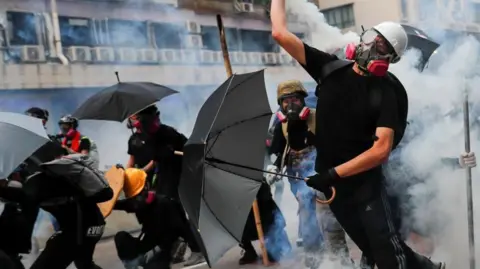 Reuters
Reuters
In 2019, anger over an extradition bill proposed by China erupted into some of the largest protests Hong Kong had ever seen
Hong Kong’s officials hail the law’s nearly 100% conviction rate but legal experts say that shows how it is being used to silence dissent – nearly 300 people have been arrested under it for a wide range of acts.
Sentencing is expected at a later date, including for the remaining 31 who pleaded guilty. Subversion carries a maximum term of life imprisonment and it’s unclear if a guilty plea warrants a reduced sentence under the NSL.
Many of the guilty pleas were “likely taken as a pragmatic decision, [as the activists] recognise that their chances of a fair trial are slim,” Mr Cheng said.
“It’s a tragic reflection of how activists are being forced into concessions just to mitigate the severity of their punishment under an increasingly authoritarian regime,” he said.
'What crime has he committed?'
“Both of us love independence, openness and freedom. What kind of crime has he committed?” says Vanessa Chan, whose husband Leung Kwok-hung was one of those who were found guilty on Thursday.
Ms Chan, an activist herself, and several others had wanted to stage a protest but they were stopped by the police outside the heavily-guarded courthouse.
Speaking to BBC Chinese ahead of the verdict, she said: “I feel sad for him… I know he feels miserable, just like I do."
Mr Leung, better known as Long Hair for his trademark hairstyle, was for decades Hong Kong’s most dogged dissident. He was jailed several times for anti-government protests but it’s different this time, said Ms Chan, who visits him in jail for just 15 minutes each day.
“[Back in the 2010s], the social environment was completely different… The pro-democracy movement was advancing. Being imprisoned was just a small setback… People felt that there was a lot to do after being released from prison.”

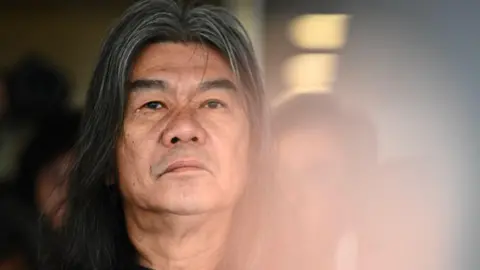 Getty Images
Getty Images
Leung Kwok-hung or Long Hair once described himself as a “Marxist revolutionary”
Now, she says, even when he is eventually out of jail, he would "only be released from a small prison to a big prison".
The couple, both in their 60s, got married just a few months before he was detained in early 2021. He has been in jail since then.
Social worker Hendrick Lui’s desire to “contribute to society" landed him in jail, said Elsa Wu, his foster mother.
Mr Lui is among the 31 who pleaded guilty – and he was one of those who contested in the unofficial primary that is at the heart of the case.
“He saw a lot of social problems, so he thought, ‘Why don’t I run in the election,’” she says, adding that she had hoped he would have an easier life after a difficult childhood.
“It would have been better if he just continued working as a social worker.”

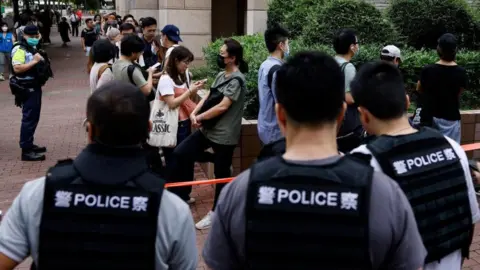 Reuters
Reuters
People queued outside the courthouse for days ahead of the verdict
'A trial of Hong Kong’s pro-democracy movement'
The unofficial primary the case centers on was held in July 2020, despite warnings from officials that it may violate the NSL. But more than 600,000 Hong Kongers voted to pick opposition candidates who could run in the upcoming elections for the Legislative Council or LegCo, Hong Kong's mini-parliament.
But the elections were postponed and when they were finally held in December 2021 after controversial reforms, pro-Beijing candidates swept to power. Only 30% of the city voted. The new laws allowed Beijing to screen who could run for office, and many of the most prominent opposition lawmakers were already facing charges under NSL.
Authorities defended prosecution of the 47 activists, saying they had a “vicious plot” to undermine the government.
But the trial was controversial. The NSL allows it to be decided by three judges handpicked by the Hong Kong government, rather than a jury, in what was seen as a departure from the city's common law traditions.
Most of the defendants have been in jail since their arrest in January 2021 - even though the trial didn't start until early 2023. They were denied bail and pre-trial detentions soon became the norm in NSL cases.
The very first bail hearing dragged on for four days, with defendants denied the possibility to change or even shower. Ten of them later fainted and several were sent to hospital.
This was “a trial of Hong Kong’s pro-democracy movement,” Eric Lai, a research fellow at the Georgetown Center for Asian Law, told the BBC.
"These verdicts effectively wipe out the whole political opposition in Hong Kong," said Sunny Cheung, who also ran in the July 2020 primary but fled the city.
Now in exile in the US, he said he misses his fellow activists: "I have been dreaming about my peers who fought [for] democracy together - the survivor guilt is immense."
Additional reporting by Frances Mao in Singapore

 7 months ago
61
7 months ago
61
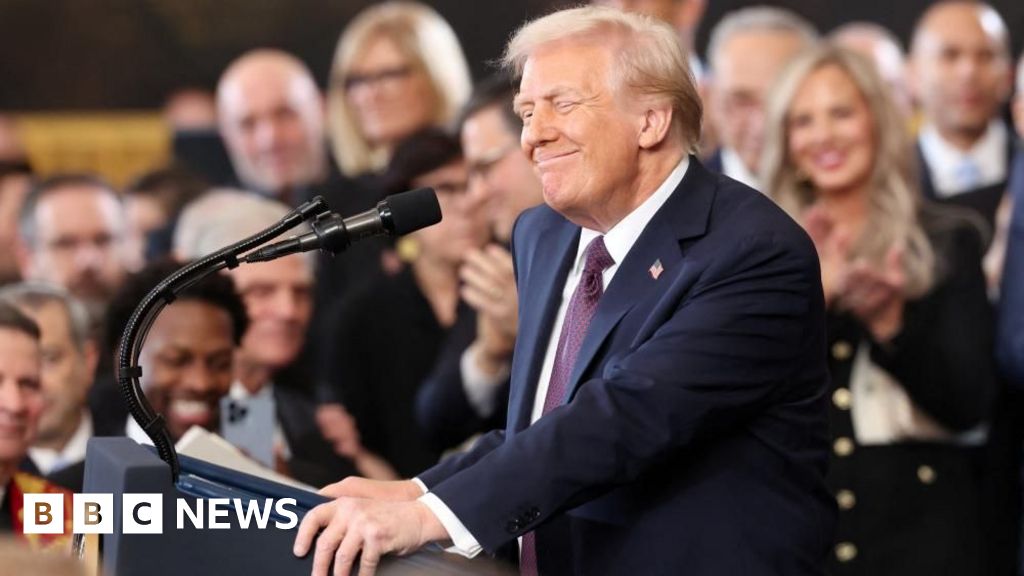
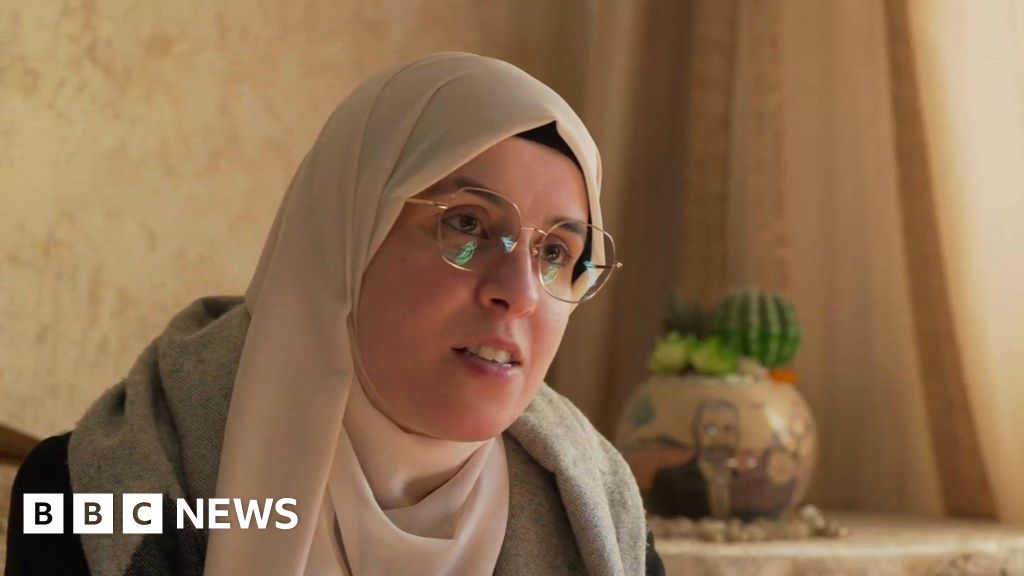






 English (US) ·
English (US) ·